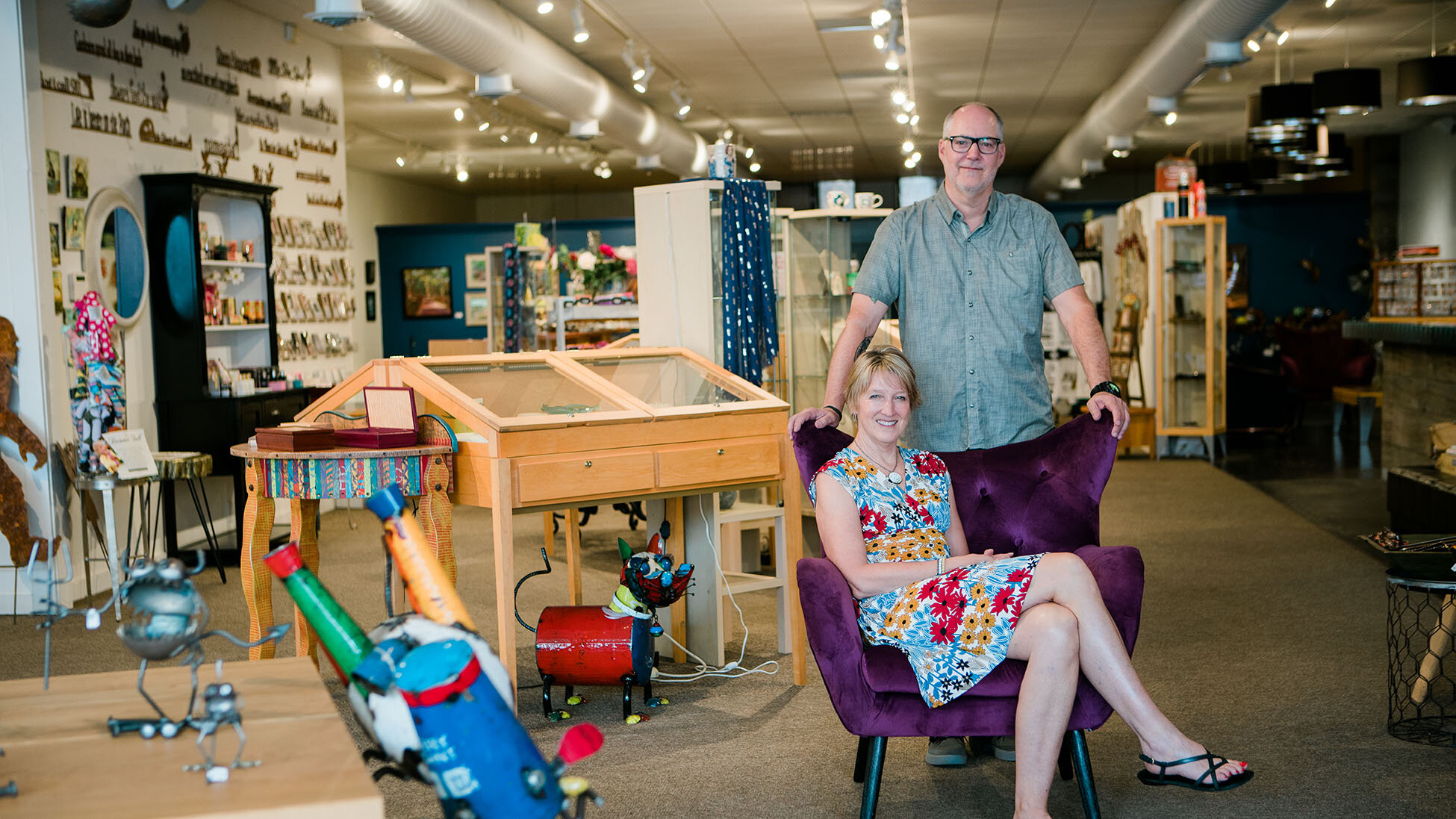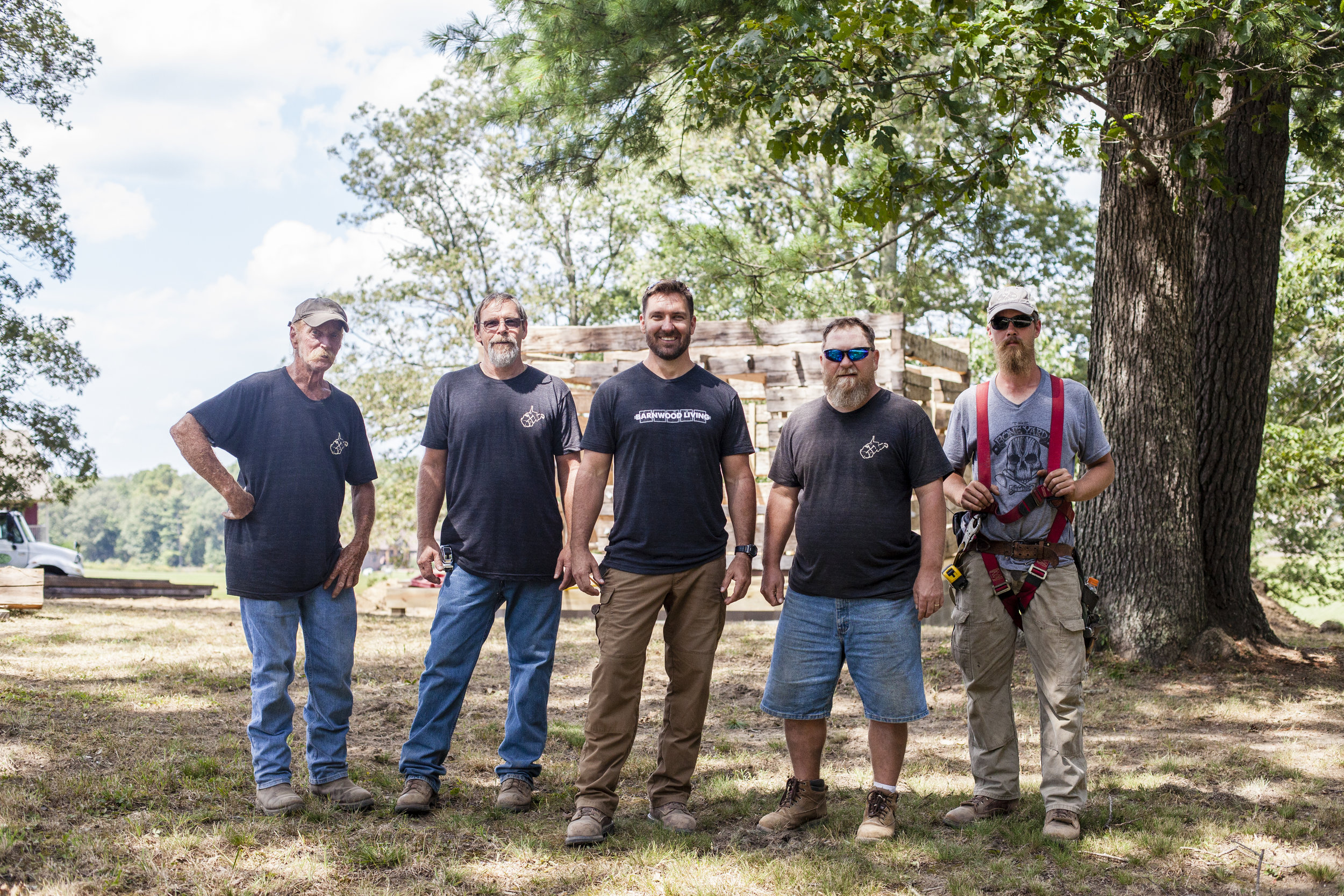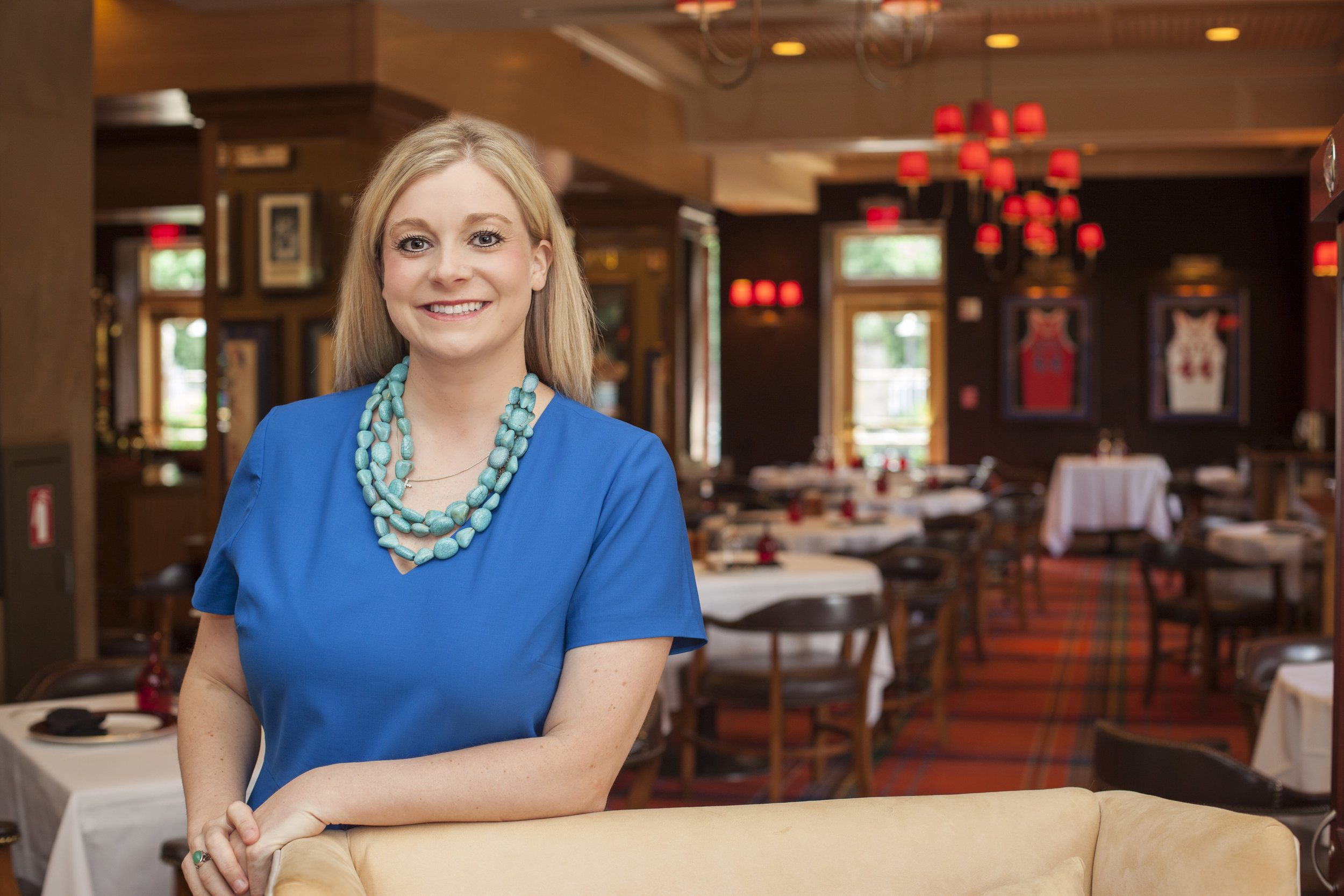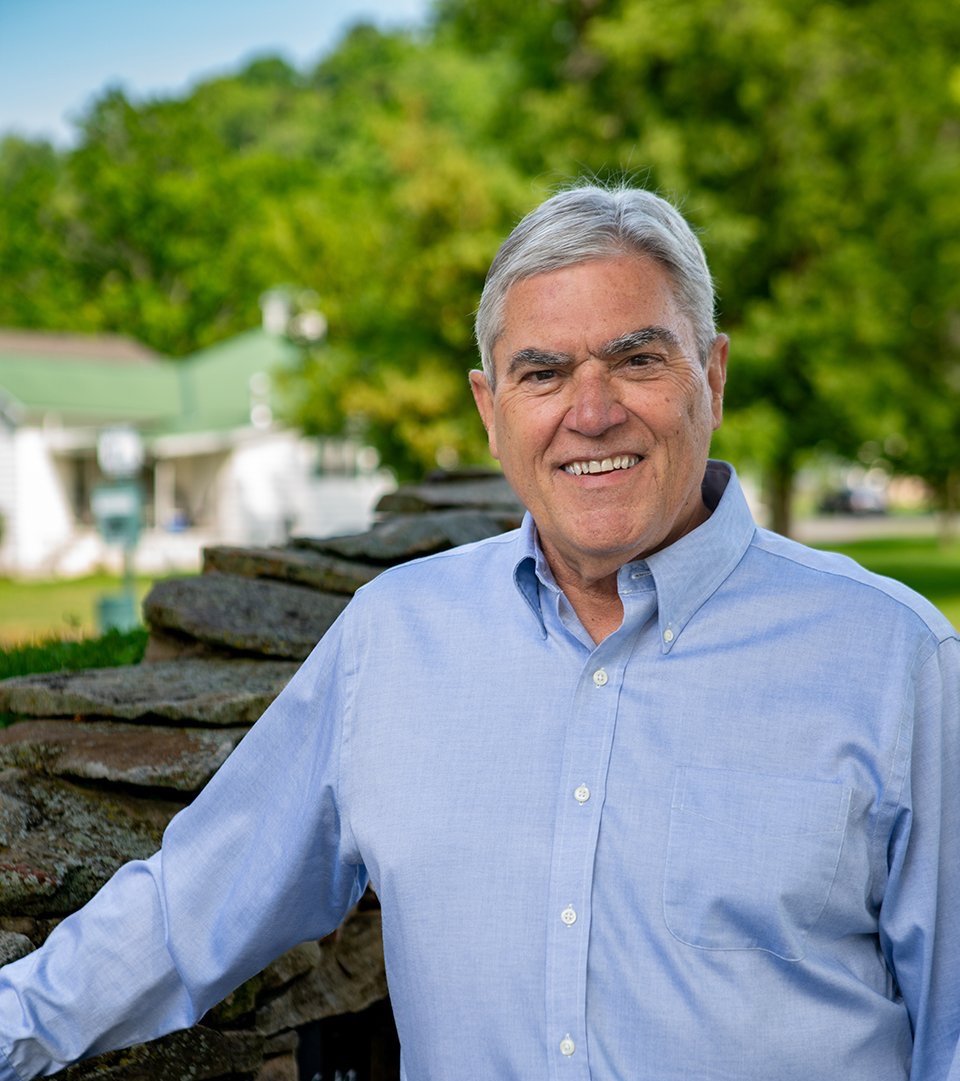Perfect Harmony

BY GREG JOHNSON
It’s hard to find the right words to describe Aaron and Monica Maxwell’s relationship with the town of Lewisburg. Small business owners? Sure. Community organizers? Yep. Cheerleaders? Definitely.
Their popular downtown store, Harmony Ridge, celebrated its sixteenth anniversary on August 1. The eclectic, spacious gallery has items ranging from a few dollars to a few thousand. Suffice it to say that if you’re looking for a special gift and you can’t find something at Harmony Ridge, you’re probably a pretty tough customer.
The Maxwells are often called on to represent the downtown merchants or interviewed when special events are taking place. But what about Aaron and Monica themselves? What inspired an energetic, visionary couple from Southern California to move to a town they’d never heard of, buy a huge old building with a leaky roof, and bet their futures on it? Well, it’s a long story.
With a little arm twisting, we persuaded Monica and Aaron to sit for an interview and, for a change, share something besides their enthusiasm for their adopted home town: their personal journey.
Monica and Aaron Maxwell of Harmony Ridge Gallery in Lewisburg, WV
GVQ: We know you’re native Southern Californians. What are your backgrounds?
Monica: My parents were German. I was the first one in my family born in the U.S. Growing up, we went back and forth to Germany and we spoke English at home when we were there, and German at home when we were in California. My dad worked as a machinist for Siemens. He was a part-time musician, too—he played the sax. My mom worked on the assembly line.
GVQ: Are you fluent in German?
Monica: Yes, and I get to practice it because, believe it or not, we get quite a few visitors from Germany in Lewisburg. I was heavily into languages in college. I loved to travel and I’d look for any chance to go overseas because I wanted to learn other languages. I worked for a summer at a grocery store in Geneva, Switzerland, because I wanted to learn French.
Aaron: My claim to fame is that I was born in the hospital that’s in the opening credits of General Hospital. I grew up in L.A. After high school, when I was going to community college, I had a job repairing burglar alarms. I’d get called at 3:00 in the morning to jewelry stores that were just robbed. Then I went to work for Univision, the Spanish television network, the fifth largest network in the country. I worked across the street from Paramount Studios. I started in the mailroom and 3 or 4 months later I got a job in Master Control, doing all kinds of things with cameras and graphics. That’s when Monica and I met. I was living in San Clemente and she was living in Laguna Beach. We met in a bar in 1989. We set up a lunch date and then after that we never dated anyone else.
Monica: We were married in 1991. Aaron was promoted to Operations Manager for Univision, and I was working in PR and marketing for the auto industry.
Monica and Aaron on one of their traveling adventures in Africa
Aaron: Then Univision decided to move the network to Miami and build a huge new facility, so we relocated to South Florida. I became Director of Broadcast Operations, which was a big job with a lot of stress.
Monica: I found a job doing corporate event planning. My main client was Mutual of Omaha. It was an awesome job with a lot of travel involved, but I was gone more than I wanted to be. We reached a crossroads – Aaron had a stressful job with long hours and I was always coming and going. We weren’t living healthy lives. We decided to open a gallery.
Aaron: It was the beginning of reinventing ourselves. I kept my job, but Monica quit hers and we opened Harmony Isle, a gallery in Fort Lauderdale.
Monica: It was a handmade American art and craft gallery. We were in a transitioning neighborhood with an art theater and a couple of cool restaurants, but it was rough around the edges, not a pretty setting. We wanted to help improve the neighborhood, so we did some of the things you would recognize from Lewisburg. We started First Fridays and recruited shops to participate. We worked with landlords to brighten up the area, and with the city to get more streetlights.
Aaron: I ended up quitting my job and we opened a second smaller shop across the street, Joy Day Gift Collections. Monica was at Harmony Isle and I was at Joy Day. My dad, who was a very talented craftsperson (he made intricate, ornate architectural models), built our jewelry display cases. My interest in crafts probably comes from him.
GVQ: How did you make the leap from two stores in Fort Lauderdale to one in Lewisburg, West Virginia? It doesn’t seem like a natural progression.
Aaron: That’s where things get interesting. Southern California had beaches and mountains and we missed the mountains. We decided to find a getaway place. We weren’t planning a permanent move. We just wanted a little mountain retreat.
Monica: We looked in North Carolina but the prices were prohibitive for small business owners. Prices were better in West Virginia, so Aaron flew to D.C. by himself, rented a car and started driving around.
Aaron: A real estate agent set me up to look at places in Davis and Thomas and Elkins and Marlinton. He didn’t mention Lewisburg. But I left Marlinton and drove down 219 looking for a place to spend the night and I ended up at the Brier Inn. The next morning I went into town to get coffee and I called Monica and said, “You would like this place.”
Monica: We bought our getaway place in Lewisburg, and every time we’d come here people would greet us like old friends. The town was charming, the area was beautiful. We would go back to Fort Lauderdale and it just felt crowded. We started wondering if we could do in Lewisburg what we were doing in Fort Lauderdale, only bigger and better.
Aaron: I was looking in the local paper and I saw an ad for the building we ended up buying. It was the True Value Home and Carpet Center. Before that it was Hanna Chevrolet. The building needed a lot of work – new wiring, new plumbing, new heating and air conditioning, a new roof. I counted 16 leaks in the ceiling.
Monica: We still get the occasional confused customer asking if we sell linoleum or carpet.
GVQ: What’s the difference between Harmony Ridge and what you were doing at Harmony Isle?
Aaron: Harmony Ridge is much larger and focuses on American made one-of-a-kind pieces, studio multiples, jewelry and a wide range of gift items. Harmony Isle was more coastal themed and focused on handmade ceramics, contemporary glass, handmade jewelry and woodwork.
Monica: Aside from the items we carry, the people here are the main difference. You don’t realize the sense of community that comes from living in a small town until you’ve done it. Everybody supports everybody else in their own way, whether it’s shopping locally or organizing an event or giving time, talent or money to nonprofit organizations. Nonprofits are another essential part of what makes a successful community. We have a lot of them here, and folks really support them.
Aaron: And we have a progressive city government that works with us. I’ll give you an example. We recruited 30 businesses to pitch in on a billboard along I-64 in Dawson advertising the downtown. During the 2008 economic downturn some of the businesses were struggling and we asked the City Council if they could help us. They decided to cover the whole cost and we hadn’t even asked them to. We were shocked! And they could have said no to First Fridays because of the shops serving wine or some other reason, but they were all for it. The Mayors and the Council Members have been very supportive.
GVQ: Do people ask you why Lewisburg seems to be thriving when so many other small towns are struggling?
Aaron: It’s a mixture of things. The setting, the shops, the proximity to I-64, the Osteopathic School, Carnegie Hall, GVT, the variety of things you can experience in a short distance walking around town. You can go on and on. There are a lot of factors, but Monica’s right, the people here are our strongest selling point.
GVQ: Okay, let’s talk about something not so positive, COVID-19 and the impact it’s having on local businesses.
Monica: Being closed at the beginning of our season was a big hit. You can’t make that up. Every month since then has been down compared to what it usually is. And it’s a challenge to operate your business safely when the guidelines are constantly changing. It’s no fun being the Mask Police. Fortunately, we have a huge space and it’s easy to socially distance, and we have complimentary masks. But we still get the occasional person who wants to come in and make a scene and tell you their political views. That makes the job “not fun.”
The eclectic, spacious gallery has items ranging from a few dollars to a few thousand. Suffice it to say that if you’re looking for a special gift and you can’t find something at Harmony Ridge, you’re probably a pretty tough customer.
GVQ: How do you handle it?
Aaron: We require our customers to wear masks. You can choose to take your business elsewhere and we totally understand. Navigating this has been the most stressful thing we’ve gone through since we’ve been here. It feels like we’re living in the eternal now and we can’t plan for anything. Just call all the days “Day” because they’re all the same.
Monica: Even though we’re experiencing a downturn, we’re surprised at the number of tourists we’ve seen since we reopened the second week of May. There are folks from major cities and states like Florida, Texas, New Jersey and New York. They’ll tell you they were looking for a place with a low COVID-19 count. Camping is huge. We’re seeing a lot more campers, and people are renting cabins. And they’re spending money! The reality is there are still a lot of people who haven’t lost their jobs. They haven’t been going on vacation or buying stuff. Someone will come in and say, “I’m ready to shop! I haven’t spent money in months!”
GVQ: Besides masks and social distancing, have you made other adjustments in the way you operate?
Monica: We’ve launched an online website because people are doing a lot more shopping from home now. We developed our site working with Heather Hanna in White Sulphur Springs, a business consultant with a group called Woodlands Community, and with Havenbrook Media in Lewisburg.
Aaron: We’re really glad we did it, but you just don’t know. You can’t let yourself think, hey, we’re back to normal. It’s conceivable that in two weeks we’ll be closed again!
GVQ: Speaking of normal, when things are normal what do you do for fun?
Monica: We love to travel and we’ve been to a lot of phenomenal places—South Africa, Argentina, Botswana, coastal Spain and France. We did a road trip in 2019, six weeks driving cross country to California and back. We’d never done a trip like that. One of the nice things about having a shop is meeting people from all over who tell you about their favorite places. I actually keep a file, and we stopped at specific places along the way that people told us about.
Aaron: Now that Lewisburg’s not our getaway place, we have one in Fairhope, Alabama. We spend some time there in the winter. We live in the mountains so we retreat to the Gulf Coast.
GVQ: Well, now we know a lot more about you. One final question. What’s something you don’t want people to know about you?
Aaron: It’s nice when couples have complementary skills, but we’re both extremely bad at remembering people’s names. And it’s not getting any better with age.
Monica: It’s not the best thing when you run a shop in a small town.
GVQ: Don’t worry, we won’t tell anybody.
VISIT harmonyridgegallery.com







